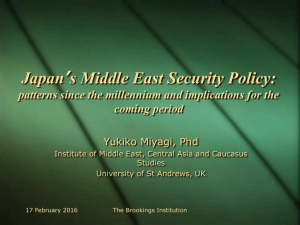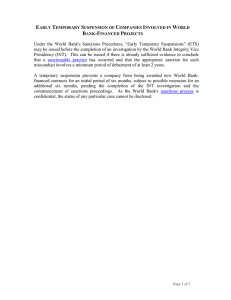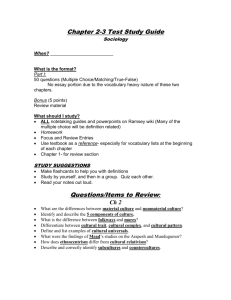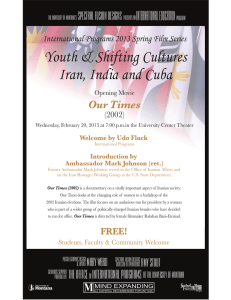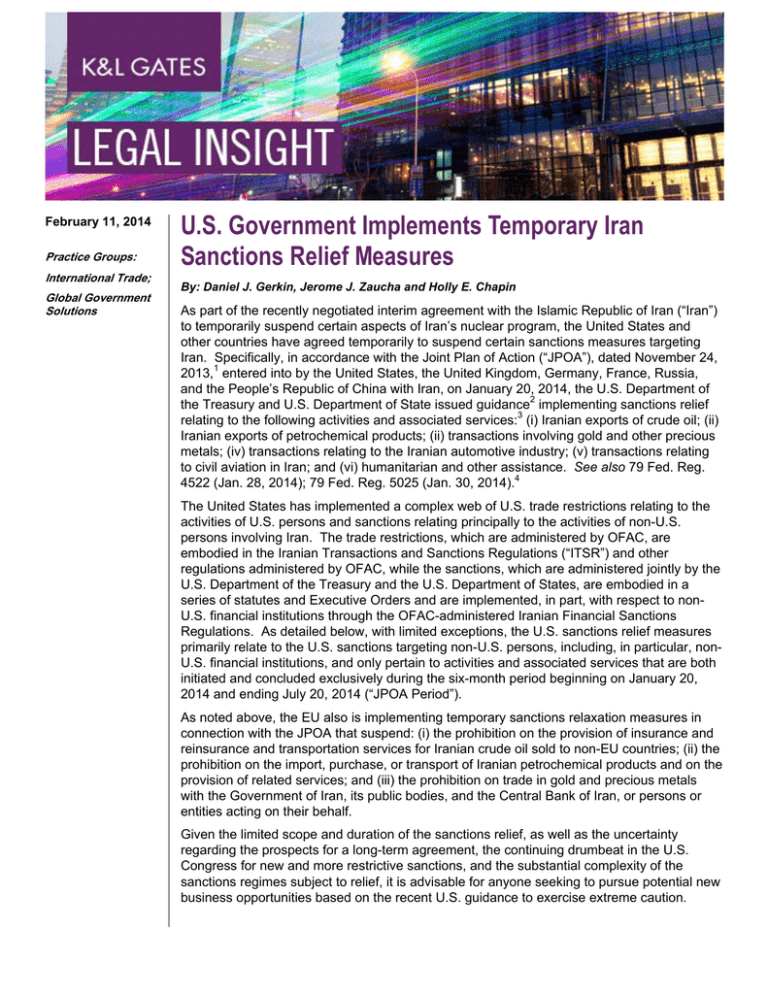
February 11, 2014
Practice Groups:
International Trade;
Global Government
Solutions
U.S. Government Implements Temporary Iran
Sanctions Relief Measures
By: Daniel J. Gerkin, Jerome J. Zaucha and Holly E. Chapin
As part of the recently negotiated interim agreement with the Islamic Republic of Iran (“Iran”)
to temporarily suspend certain aspects of Iran’s nuclear program, the United States and
other countries have agreed temporarily to suspend certain sanctions measures targeting
Iran. Specifically, in accordance with the Joint Plan of Action (“JPOA”), dated November 24,
2013,1 entered into by the United States, the United Kingdom, Germany, France, Russia,
and the People’s Republic of China with Iran, on January 20, 2014, the U.S. Department of
the Treasury and U.S. Department of State issued guidance2 implementing sanctions relief
relating to the following activities and associated services:3 (i) Iranian exports of crude oil; (ii)
Iranian exports of petrochemical products; (ii) transactions involving gold and other precious
metals; (iv) transactions relating to the Iranian automotive industry; (v) transactions relating
to civil aviation in Iran; and (vi) humanitarian and other assistance. See also 79 Fed. Reg.
4522 (Jan. 28, 2014); 79 Fed. Reg. 5025 (Jan. 30, 2014).4
The United States has implemented a complex web of U.S. trade restrictions relating to the
activities of U.S. persons and sanctions relating principally to the activities of non-U.S.
persons involving Iran. The trade restrictions, which are administered by OFAC, are
embodied in the Iranian Transactions and Sanctions Regulations (“ITSR”) and other
regulations administered by OFAC, while the sanctions, which are administered jointly by the
U.S. Department of the Treasury and the U.S. Department of States, are embodied in a
series of statutes and Executive Orders and are implemented, in part, with respect to nonU.S. financial institutions through the OFAC-administered Iranian Financial Sanctions
Regulations. As detailed below, with limited exceptions, the U.S. sanctions relief measures
primarily relate to the U.S. sanctions targeting non-U.S. persons, including, in particular, nonU.S. financial institutions, and only pertain to activities and associated services that are both
initiated and concluded exclusively during the six-month period beginning on January 20,
2014 and ending July 20, 2014 (“JPOA Period”).
As noted above, the EU also is implementing temporary sanctions relaxation measures in
connection with the JPOA that suspend: (i) the prohibition on the provision of insurance and
reinsurance and transportation services for Iranian crude oil sold to non-EU countries; (ii) the
prohibition on the import, purchase, or transport of Iranian petrochemical products and on the
provision of related services; and (iii) the prohibition on trade in gold and precious metals
with the Government of Iran, its public bodies, and the Central Bank of Iran, or persons or
entities acting on their behalf.
Given the limited scope and duration of the sanctions relief, as well as the uncertainty
regarding the prospects for a long-term agreement, the continuing drumbeat in the U.S.
Congress for new and more restrictive sanctions, and the substantial complexity of the
sanctions regimes subject to relief, it is advisable for anyone seeking to pursue potential new
business opportunities based on the recent U.S. guidance to exercise extreme caution.
U.S. Government Implements Temporary Iran Sanctions
Relief Measures
Iranian Exports of Petroleum and Petroleum Products.
Subject to certain exceptions, U.S. law authorizes the imposition of sanctions on non-U.S.
persons for engaging in certain activities relating to the energy sector of Iran, including, in
particular, significant transactions for the purchase, acquisition, sale, transport, or marketing
of petroleum or petroleum products from Iran.
Pursuant to a sanctions waiver set forth in the relief guidelines, during the JPOA Period the
following countries will be permitted to maintain their current average level of imports of
petroleum and petroleum products from Iran: China, India, Japan, the Republic of Korea,
Taiwan, and Turkey. Services associated with such transactions will not subject the service
providers to sanctions during the JPOA period. As part of this relief, the U.S. Government
will not require U.S. financial institutions to impose correspondent or payable-through
account sanctions with respect to foreign financial institutions under the primary jurisdiction
of China, India, Japan, the Republic of Korea, Taiwan, and Turkey that conduct or facilitate
transactions exclusively during the JPOA Period by non-U.S. persons not otherwise subject
to the ITSR5 relating to the export of petroleum or petroleum products from Iran to these
countries, as well as associated insurance and transportation services, including transactions
involving the National Iranian Oil Company (“NIOC”) or the National Iranian Tanker
Company (“NITC”).6 Please note, however, that these transactions cannot involve persons
on the SDN List other than NIOC, NITC, or any Iranian depository institutions listed solely
pursuant to Executive Order 13599, which essentially means no Iranian financial institutions
that are specifically designated on the SDN List as supporting terrorism or the proliferation of
weapons of mass destruction.
In addition, under the JPOA, approximately $4.2 billion held in accounts in non-U.S. financial
institutions that have been designated under the U.S. sanctions relief guidelines as
Restricted Funds7 are permitted to be repatriated in eight installments throughout the JPOA
Period, contingent on the fulfillment by Iran of its commitments under the JPOA.8
Furthermore, the U.S. Government will not impose blocking sanctions (i.e., the designation of
entities as SDNs and an associated asset freeze) with respect to non-U.S. persons not
otherwise subject to the ITSR that, exclusively during the JPOA Period, materially assist,
sponsor, or provide financial, material, or technological support for, or goods or services, in
support of the above-described exports of petroleum or petroleum products from Iran to
China, India, Japan, the Republic of Korea, Taiwan, and Turkey.
The U.S. Government also is suspending the application of so-called “menu-based”
sanctions relating to petroleum-related transactions. By statute, the U.S. Government is
required to impose a certain number sanctions from a “menu” of available sanctions when
imposing sanctions for petroleum-related trade with Iran.
Iranian Exports of Petrochemical Products.
U.S. law authorizes the imposition of sanctions on non-U.S. persons for engaging in certain
activities relating to the petrochemical sector of Iran, including, in particular, significant
transactions for the purchase, acquisition, sale, transport, or marketing of petrochemical
products from Iran. These activities will not subject the involved parties to sanctions during
the JPOA Period. As with petroleum and petroleum products transactions, as part of this
relief, the U.S. Government will not require U.S. financial institutions to impose
correspondent or payable-through account sanctions with respect to foreign financial
2
U.S. Government Implements Temporary Iran Sanctions
Relief Measures
institutions that conduct or facilitate transactions by non-U.S. persons not otherwise subject
to the ITSR involving the export of petrochemical products, as defined in Executive Order
13622, initiated and completed during the JPOA Period, and will not impose blocking
sanctions with respect to persons engaged in activities ancillary to such transactions. The
transactions at issue, however, cannot involve persons on the SDN List, with the exception
of 14 specifically enumerated Iranian petrochemical companies and any Iranian depository
institutions listed solely pursuant to Executive Order 13599. The U.S. Government also is
suspending the application of additional “menu-based” sanctions required to be imposed on
non-U.S. persons in connection with sanctions for engaging in specified petrochemical
transactions.
Transactions Involving Gold and Other Precious Metals.
U.S. law authorizes the imposition of sanctions on non-U.S. persons for engaging in certain
activities relating to precious metals, including, in particular, the sale, supply, or transfer,
directly or indirectly, to or from Iran, of any precious metal. These activities will not subject
the involved parties to sanctions during the JPOA Period. As part of this relief, the U.S.
Government will not require U.S. financial institutions to impose correspondent or payablethrough account sanctions with respect to foreign financial institutions that conduct or
facilitate transactions by non-U.S. persons not otherwise subject to the ITSR for the
purchase or acquisition of precious metals to or from Iran that are initiated and completed
during the JPOA Period. However, the funds for the purchase of any such precious metals
may not be drawn from Restricted Funds and the transactions cannot involve persons on the
SDN List other than Government of Iran entities and Iranian depository institutions listed
solely pursuant to Executive Order 13599. In addition, the U.S. Government will not impose
blocking sanctions with respect to persons engaged in activities ancillary to such
transactions during the JPOA Period.
Transactions Involving the Iranian Automotive Industry.
Under U.S. law, non-U.S. persons may be sanctioned for engaging in significant transactions
for the sale, supply, or transfer to Iran of significant goods or services used in connection
with the automotive sector in Iran. These activities will not subject the involved parties to
sanctions during the JPOA Period. During the JPOA Period, the U.S. Government also is
suspending the requirement that U.S. financial institutions impose correspondent or payablethrough account and menu-based sanctions in connection with the sale, supply, or transfer to
Iran of goods, including complete knock-down kits, and services, including shipping,
warranty, insurance, and maintenance services, used in connection with the Iranian
automotive sector9 by non-U.S. persons not otherwise subject to the ITSR, as well as
associated services, provided that such transactions do not involve any persons on the SDN
List other than Iranian depository institutions listed solely pursuant to Executive Order 13599.
3
U.S. Government Implements Temporary Iran Sanctions
Relief Measures
Transactions Relating to Civil Aviation in Iran.
The ITSR generally prohibit the exportation, reexportation, sale or supply, directly or
indirectly, from the United States or by a U.S. person, wherever located, of any goods,
technology, or services to Iran or the Government of Iran. Furthermore, the ITSR generally
prohibit the reexportation by a non-U.S. person from a third country, directly or indirectly, to
Iran or the Government of Iran of any goods that have been exported from the United States,
if the exportation of such goods from the United States to Iran was subject to applicable U.S.
export license application requirements.
However, pursuant to the Statement of Licensing Policy on Activities Related to the Safety of
Iran’s Civil Aviation Industry,10 which was published by OFAC coincident with the JPOA
guidance, U.S. persons, non-U.S. entities owned or controlled by U.S. persons, and nonU.S. persons can request specific authorization from OFAC to engage in otherwise
prohibited exports or reexports that are initiated and completed entirely within the JPOA
Period to ensure the safe operation of Iranian commercial passenger aircraft, including
transactions involving Iran Air, but not other Iranian airlines appearing on the SDN List. The
activities that may be licensed include, but are not limited to, the exportation and
reexportation of services related to the inspection, repair, or servicing of commercial aircraft
and parts in Iran or a third country and goods, including spare parts, to Iran or a third
country. Any licensed activity must be concluded by July 20, 2014.
Furthermore, in connection with activities described in the statement of licensing policy (see
above) conducted by non-U.S. persons that would not require a specific OFAC license, the
U.S. Government will not require U.S. financial institutions to impose correspondent or
payable-through account sanctions with respect to foreign financial institutions that conduct
or facilitate such activities, provided that such activities are initiated and concluded entirely
within the JPOA Period and do not involve persons other than Iran Air or Iranian depository
institutions listed solely pursuant to Executive Order 13599 on the SDN List.
Finally, the U.S. Government will not impose blocking sanctions on non-U.S. persons
engaged in ancillary activities within the scope of the JPOA guidance.
Humanitarian and Other Assistance.
The JPOA also established a mechanism whereby foreign financial institutions selected by
Iran and specifically contacted and advised by the U.S. Government will be permitted to
facilitate purchases by Iran food, agricultural commodities, medicine, and medical devices,
as well as Iran’s payment of its United Nations obligations, payments for medical expenses
incurred by Iranian citizens outside of Iran, and payments totaling approximately $400 million
in tuition assistance for Iranian students studying outside of Iran. Please note, however, that
preexisting exceptions to the U.S. sanctions regime generally permit humanitarian trade with
Iran such that the above-described mechanism is not the exclusive means for non-U.S.
persons not otherwise subject to the ITSR to facilitate or finance such sales.
*
*
*
With the exception of humanitarian trade and activities relating to civil aviation in Iran, U.S.
persons and their owned or controlled non-U.S. affiliates are not impacted by the temporary
sanctions relief detailed above. Indeed, the sanctions relief specifically targets so-called
“secondary” sanctions, which apply to non-U.S. persons even when no U.S. persons or items
4
U.S. Government Implements Temporary Iran Sanctions
Relief Measures
of U.S.-origin are involved. The sanctions relief window, however, even in the case of nonU.S. persons, is quite narrow and non-U.S. persons intending to engage in transactions on
the basis that they temporarily are free from sanctions are advised to carefully assess
whether such transactions are, in fact, exempt from sanctions and whether such transactions
reasonably can be concluded prior to July 20, 2014. Also, please be aware that if Iran fails
to live up to its commitments, the temporary sanctions relief may be terminated, even prior to
July 20, 2014.
For assistance understanding and applying the temporary sanctions relief, please contact
Daniel J. Gerkin, Donald W. Smith, or Jerome J. Zaucha in Washington in connection with
U.S. implementation issues and Vanessa Edwards in London in connection with EU
implementation issues.
Authors:
Daniel J. Gerkin
Of Counsel
daniel.gerkin@klgates.com
+1.202.778.9168
Jerome J. Zaucha
Partner
jerome.zaucha@klgates.com
+1.202.778.9013
Holly E. Chapin
Associate
holly.chapin@klgates.com
+1.202.778.9022
Anchorage Austin Beijing Berlin Boston Brisbane Brussels Charleston Charlotte Chicago Dallas Doha Dubai Fort Worth Frankfurt
Harrisburg Hong Kong Houston London Los Angeles Melbourne Miami Milan Moscow Newark New York Orange County Palo Alto Paris
Perth Pittsburgh Portland Raleigh Research Triangle Park San Diego San Francisco São Paulo Seattle Seoul Shanghai Singapore Spokane
Sydney Taipei Tokyo Warsaw Washington, D.C. Wilmington
K&L Gates practices out of 48 fully integrated offices located in the United States, Asia, Australia, Europe, the Middle East and South
America and represents leading global corporations, growth and middle-market companies, capital markets participants and
entrepreneurs in every major industry group as well as public sector entities, educational institutions, philanthropic organizations and
individuals. For more information about K&L Gates or its locations, practices and registrations, visit www.klgates.com.
This publication is for informational purposes and does not contain or convey legal advice. The information herein should not be used or relied upon in
regard to any particular facts or circumstances without first consulting a lawyer.
©2014 K&L Gates LLP. All Rights Reserved.
5
U.S. Government Implements Temporary Iran Sanctions
Relief Measures
1 The JPOA may be accessed at http://eeas.europa.eu/statements/docs/2013/131124_03_en.pdf.
2 See http://www.treasury.gov/resource-center/sanctions/Programs/Documents/jpoa_guidance.pdf; see also
http://www.treasury.gov/resourcecenter/sanctions/Programs/Documents/jpoa_faqs.pdf.
3 For purposes of the JPOA sanctions relief, the term “associated service” means any necessary service,
including any insurance, transportation, or financial service, ordinarily incident to the underlying activity
covered by the JPOA, provided that, with certain exceptions, such services may not involve persons
identified on the List of Specially Designated Nationals and Blocked Persons (“SDN List”) maintained by
the U.S. Department of the Treasury, Office of Foreign Assets Control (“OFAC”).
4 Please note that the European Union likewise implemented temporary sanctions relief, effective January
20, 2014, through Council Regulation 2014/42/EU, which amended Council Regulation (EU) 267/2012
(see a further description of the EU relief below).
5 The term “non-U.S. persons not otherwise subject to the ITSR” refers to non-U.S. persons that are neither
owned or controlled by U.S. persons.
6 Any funds owed to Iran as a result of such trade must be credited to an account located in the country
with primary jurisdiction over the foreign financial institution involved in the transaction. However, as
detailed below, please note that these funds may not be used for the purchase or acquisition of gold or other
previous metals.
7 “Restricted Funds” refers to: (i) any existing and future revenues from the sale of Iranian petroleum or
petroleum products, wherever held; and (ii) any Central Bank of Iran (“CBI”) funds, with certain
exceptions for non-petroleum CBI funds held in third country central banks.
8 Certain financial institutions in the above-listed six countries, as well as financial institutions under the
primary jurisdiction of Switzerland, may be notified directly in writing by the U.S. Government that they
are authorized to engage in financial transactions with the Central Bank of Iran in connection with the
repatriation of revenues and the establishment of a financial channel for humanitarian and other assistance,
as detailed below. Only those financial institutions that are contacted by the U.S. Government directly will
be permitted to engage in these activities without risking the imposition of U.S. sanctions.
9 The Iranian automotive sector means the manufacturing or assembling in Iran of light and heavy vehicles,
including passenger cars, trucks, buses, minibuses, pick-up trucks, and motorcycles, as well as original
equipment manufacturing and aftermarket parts manufacturing relating to such vehicles.
10 See http://www.treasury.gov/resource
center/sanctions/Programs/Documents/civil_aviation_slp_iran.pdf.
6


